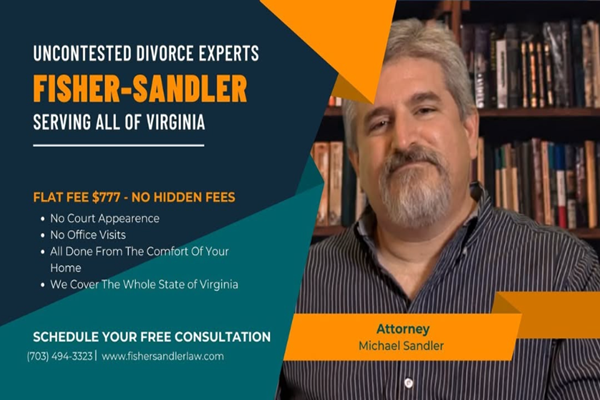
Uncontested Divorce Attorney in Virginia | Fisher-Sandler
Going through a divorce doesn’t always have to be a contentious, expensive battle. In Virginia, many people choose the path of uncontested divorce – a simpler, more cost-effective approach to ending their marriage. As experienced uncontested divorce attorneys in Virginia, Fisher-Sandler has helped hundreds of couples navigate this process with dignity and efficiency.
Navigating the complexities of divorce in Virginia can be one of the most challenging experiences in life. However, if both parties are in agreement and wish to part ways amicably, an uncontested divorce may be the best option. An uncontested divorce in Virginia allows couples to dissolve their marriage without the emotional turmoil and financial strain often associated with contested divorces.
👉Call (703) 494-3323 FREE Consultation👈

In Virginia, the process of obtaining an uncontested divorce is streamlined, provided that both spouses can reach a mutual agreement on key issues such as property division, child custody, and support. As experienced uncontested divorce attorneys in Virginia, we are here to guide you through every step of this process, ensuring that your rights are protected and that you achieve a fair resolution.
This webpage will provide you with a comprehensive understanding of uncontested divorce in Virginia, including eligibility requirements, the divorce process, common issues that may arise, and the benefits of hiring an attorney. Whether you are just beginning to consider divorce or are ready to take the next steps, this information will empower you to make informed decisions for your future.
What is an Uncontested Divorce in Virginia?
An uncontested divorce in Virginia is a legal dissolution of marriage where both parties agree on all significant issues related to the divorce, including property division, child custody, child support, and spousal support. This type of divorce is often more straightforward and less time-consuming than a contested divorce, where the parties cannot reach an agreement and must rely on the court to make decisions, often spending thousands of dollars on attorney fees.
Key Features of an Uncontested Divorce in Virginia?
1. Mutual Agreement: In an uncontested divorce, both spouses must agree on all terms of the divorce. This includes how to divide marital assets and debts, arrangements for any children, and any financial support obligations. The agreement is typically formalized in a written document known as a separation agreement.
2. Filing Process: To initiate an uncontested divorce in Virginia, one spouse (the petitioner) must file a complaint for divorce in the appropriate circuit court. The other spouse (the respondent) must be served with the divorce papers. If both parties agree on the terms, the respondent can sign a waiver of service, simplifying the process.
3. Residency Requirements: Virginia law requires at least one spouse to be a resident of the state for a minimum of six months before filing for divorce. This residency requirement ensures that the court has jurisdiction over the case.
4. Grounds for Divorce: In Virginia, uncontested divorces is based on living separate and apart for at least one year (or six months if there are no minor children and both parties agree).
5. Court Hearing: The way we do these cases, no court appearance is needed if it is truly uncontested.
6. Finalizing the Divorce: Once the court reviews the separation agreement and any other required documents, it will issue a final decree of divorce. This decree legally ends the marriage and outlines the terms agreed upon by both parties.

Benefits of Uncontested Divorce in Virginia?
1. Cost-Effectiveness
Uncontested divorces typically incur lower legal fees compared to contested divorces. Since both parties agree on the terms, they often require less time from attorneys and fewer court appearances, which can significantly reduce overall costs.
2. Faster Resolution
The timeline for an uncontested divorce is generally much shorter. With both parties in agreement, the process can be completed quickly, often within a few months. This allows individuals to move on with their lives sooner than they would in a contested divorce, which can drag on for months or even years.
3. Less Stressful
Divorce can be an emotionally taxing experience. An uncontested divorce minimizes conflict and adversarial interactions, leading to a more amicable separation. This collaborative approach can reduce the emotional strain on both parties, making the transition smoother.
4. Control Over Outcomes
In an uncontested divorce, both parties have the opportunity to negotiate and agree on the terms that work best for their unique situation. This level of control can lead to more satisfactory outcomes, as both individuals can tailor arrangements regarding property division, child custody, and support to fit their needs.
5. Privacy
Uncontested divorces often involve less public scrutiny than contested cases. Since there are fewer court hearings and less contentious litigation, sensitive personal matters are less likely to be aired in public, allowing for greater privacy during the divorce process.
6. Simplified Process
The paperwork and procedures for an uncontested divorce are generally more straightforward. With both parties agreeing on the terms, the necessary documentation can be completed more efficiently, reducing the complexity of the legal process.
7. Better Co-Parenting Relationships
For couples with children, an uncontested divorce can foster a more cooperative co-parenting relationship. By working together to reach agreements, parents can set a positive tone for future interactions, which is beneficial for their children’s well-being.
8. Reduced Court Involvement
In a typical case, uncontested divorces do not require a court hearing if all paperwork is in order. This reduces the burden on the court system and allows couples to finalize their divorce without extensive legal proceedings.
The Uncontested Divorce Process in Virginia
The uncontested divorce process in Virginia is designed to be straightforward and efficient for couples who agree on the terms of their divorce. Below is a step-by-step guide to navigating this process:
Step 1: Determine Eligibility
To qualify for an uncontested divorce in Virginia, both parties must agree on all aspects of the divorce, including:
- Division of marital property and debts
- Child custody and visitation arrangements (if applicable)
- Child support (if applicable)
- Spousal support (if applicable)
Additionally, at least one spouse must have been a resident of Virginia for at least six months prior to filing.
Step 2: Complete the Necessary Forms
The following forms are typically required for an uncontested divorce in Virginia:
- Complaint for Divorce: This document initiates the divorce process and outlines the grounds for divorce.
- Separation Agreement: A written agreement detailing the terms of the divorce, including property division, custody, and support.
- Affidavit of Service: A form confirming that the other spouse has been served with the divorce papers.
- Final Decree of Divorce: This document finalizes the divorce and must be signed by a judge.
Step 3: File the Forms
Once the forms are completed, they must be filed with the circuit court in the county or city where either spouse resides. There is typically a filing fee, which varies by jurisdiction.
Step 4: Serve the Other Spouse
After filing, the next step is to serve the other spouse with the divorce papers. This can be done through:
- Personal service by a sheriff or process server
- Certified mail (with a return receipt)
- Acknowledgment of service (if the spouse agrees to sign)
The spouse receiving the papers must sign the Affidavit of Service to confirm they have been notified.
Step 5: Wait for the Response
In an uncontested divorce, the responding spouse typically does not contest the divorce. However, they must sign the waiver and the Final Decree of Divorce. If they agree, they can return these signed documents to the filing spouse.
Step 6: Submit the Final Decree
Once both parties have signed the necessary documents, the filing spouse must submit the Final Decree of Divorce to the court for approval. A judge will review the documents, and if everything is in order, they will sign the decree, finalizing the divorce.
Step 7: Obtain a Copy of the Final Decree
After the judge signs the Final Decree, it is important to obtain a certified copy for personal records. This document serves as legal proof of the divorce.
The uncontested divorce process in Virginia is designed to be efficient and amicable for couples who can agree on the terms of their separation. By following these steps, individuals can navigate the process with clarity and ease, allowing them to move forward with their lives. It is advisable to consult with a legal professional to ensure that all documents are completed correctly and that both parties’ rights are protected throughout the process.
In conclusion, an uncontested divorce in Virginia offers a quicker and more peaceful option for couples seeking to end their marriage. By understanding the requirements and following the outlined steps, couples can navigate this process efficiently and effectively. Don’t let the complexities of divorce hold you back—seek professional assistance today to ensure a smooth transition into this new chapter of your life.

Frequently Asked Questions (FAQs)
1. How long does an uncontested divorce take in Virginia?
The length of an uncontested divorce in Virginia can vary depending on several factors, such as the complexity of the case, the court’s schedule, and the timely submission of required documents. Generally, an uncontested divorce can be finalized within 60 to 90 days from the date of filing, assuming both parties are in agreement and all necessary paperwork is submitted promptly.
2. Do I need to hire an attorney for an uncontested divorce in Virginia?
While it is not mandatory to hire an attorney for an uncontested divorce in Virginia, it is highly recommended. An experienced uncontested divorce attorney Virginia can ensure that all necessary paperwork is completed accurately and filed on time, reducing the risk of delays or complications. Additionally, an attorney can provide valuable guidance and advice throughout the process, helping you navigate any potential issues and protect your interests.
3. Can I represent myself in an uncontested divorce in Virginia?
Yes, you can represent yourself in an uncontested divorce in Virginia. However, it is important to note that the court will not provide legal advice or assistance, and any mistakes made during the process could result in delays or complications. Representing yourself also means that you will be responsible for understanding and complying with all relevant laws and procedures, which can be complex and confusing for those without legal training.
4. What if my spouse and I disagree on one or more issues during the uncontested divorce process?
If you and your spouse disagree on one or more issues during the uncontested divorce process, your case may no longer be considered uncontested. In this case, you may need to convert your case to a contested divorce, which can be more time-consuming, expensive, and emotionally challenging. It is essential to discuss any potential disagreements with your uncontested divorce attorney in Virginia as soon as possible to explore options for resolving the issues and keeping your case uncontested if possible.
5. What are the costs associated with an uncontested divorce in Virginia?
Fisher-Sandler charges a flat fee of $777 to file your uncontested divorce in Virginia. This fee includes the filing and other fees.
6. Do You Have to Go to Court for an Uncontested Divorce?
No, a court appearance is not required for an uncontested divorce. The necessary documents are prepared by the divorce attorney or legal service, and all filings are handled by the office. Once the judge signs the divorce decree, it is sent to the couple.
7. What are the grounds for a No-Fault Divorce in Virginia?
Separation for Six Months:
- If the couple has lived separately and apart without cohabitation for at least six months, they can file for a no-fault divorce. This applies only if there are no minor children involved and they have signed a separation agreement.
Separation for One Year:
- If the couple has lived separately and apart for at least one year, they can file for a no-fault divorce. This applies regardless of whether there are minor children.
8. What if my spouse lives in another state other than Virginia?
- Virginia Residency: At least one spouse must be a resident of Virginia for at least six months before filing for divorce. If you meet this requirement, you can proceed with the divorce in Virginia.
- Spouse’s Residency: Your spouse does not need to be a resident of Virginia to file for divorce there, especially in an uncontested case.
Why Choose Our Uncontested Divorce Attorneys in Virginia?
If you are considering an uncontested divorce in Virginia and need guidance through the process, it is crucial to consult with an experienced uncontested divorce attorney in Virginia at Fisher-Sandler. They can help you draft a thorough separation agreement, ensure that all necessary documents are filed correctly, and navigate any potential issues that may arise.
By working with an expert uncontested divorce attorney in Virginia, you can streamline the process, reduce costs, and expedite your divorce. Don’t hesitate to seek professional advice to ensure that your divorce is handled efficiently and with minimal emotional strain.

Contact Us Today:
At Fisher-Sandler, we specialize in uncontested divorces in Virginia. Our dedicated team of family law attorneys is here to guide you through every step of the process. Contact us today to schedule a free consultation and let us help you finalize your divorce quickly and smoothly.

_______________________________________________
About Virginia:
A Brief History of Virginia
Virginia, one of the original thirteen colonies, has a rich and diverse history that dates back to its establishment in 1607 with the founding of Jamestown, the first permanent English settlement in North America. The colony played a pivotal role in the American Revolution, producing influential figures such as George Washington and Thomas Jefferson. Virginia was also the site of significant Civil War battles, reflecting its divided loyalties. Post-war, the state underwent Reconstruction and industrialization, leading to economic growth. Today, Virginia is known for its historical landmarks, including Monticello and Colonial Williamsburg, which attract visitors eager to explore its colonial and Civil War heritage. The state’s blend of historical significance and natural beauty continues to shape its identity, making it a vital part of American history.
What To Do In Virginia
Virginia boasts a wealth of attractions that cater to diverse interests. History enthusiasts can explore Colonial Williamsburg, a living history museum that recreates 18th-century life, or visit Monticello, the iconic home of Thomas Jefferson. For nature lovers, Shenandoah National Park offers breathtaking views, hiking trails, and opportunities for wildlife observation along the scenic Skyline Drive. The Virginia Beach coastline provides a vibrant atmosphere for sunbathing, water sports, and boardwalk entertainment. Wine aficionados can indulge in tastings at the numerous vineyards in the Virginia Wine Country, while families can enjoy interactive exhibits at the Virginia Aquarium & Marine Science Center. With its blend of historical significance, natural beauty, and recreational activities, Virginia is a destination that promises memorable experiences for all visitors.
Points Of Interest In Virginia
Virginia is rich in history and natural beauty, offering a variety of points of interest for visitors. One of the most notable sites is Colonial Williamsburg, where you can step back in time and experience life in the 18th century. More information can be found at [Colonial Williamsburg](https://www.colonialwilliamsburg.com). Another must-see is Monticello, the historic home of Thomas Jefferson, which showcases his architectural genius and gardens; visit [Monticello](https://www.monticello.org) for details. Nature enthusiasts will appreciate Shenandoah National Park, known for its stunning vistas and hiking trails along the Skyline Drive; explore more at [Shenandoah National Park](https://www.nps.gov/shen/index.htm). For a coastal experience, Virginia Beach offers beautiful sandy shores and a lively boardwalk, perfect for relaxation and recreation; check out [Virginia Beach](https://www.visitvirginiabeach.com). Wine lovers can indulge in tastings at the numerous vineyards in Virginia Wine Country, with many wineries providing tours and events; find out more at [Virginia Wine](https://www.virginiawine.org). Lastly, the Virginia Aquarium & Marine Science Center is ideal for families, featuring interactive exhibits and marine life; visit [Virginia Aquarium](https://www.virginiaaquarium.com) for more information. With its diverse attractions, Virginia promises unforgettable experiences for every traveler.
FAQs about Virginia
1. What are the top attractions in Virginia?
Virginia is home to Colonial Williamsburg, Monticello, Shenandoah National Park, Virginia Beach, and numerous wineries.
2. When is the best time to visit Virginia?
The best time to visit is during the spring and fall when the weather is mild and the foliage is beautiful.
3. Are there outdoor activities available in Virginia?
Yes, Virginia offers hiking, biking, and water sports, especially in Shenandoah National Park and along the coast.
4. What historical sites can I explore in Virginia?
You can explore significant sites like Monticello, the homes of several U.S. presidents, and Civil War battlefields.
5. Is Virginia family-friendly?
Absolutely! Virginia has many family-friendly attractions, including the Virginia Aquarium, theme parks, and interactive museums.

Recent Comments